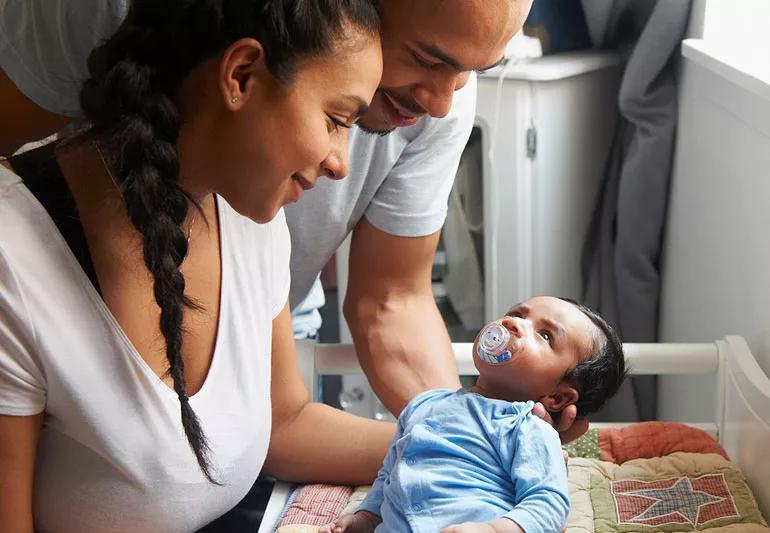Home weight monitoring in healthy newborn infants is feasible

Image content: This image is available to view online.
View image online (https://assets.clevelandclinic.org/transform/f4d9c7e6-2567-4bc9-b8fc-309f5557216b/parents-Newborn-592016187-770x533-1-jpg)
Newborn
Findings from a new pilot study show that remote home weight monitoring in healthy newborn infants is feasible and also reduced office visits by 25% after the first week of an infant’s life. These findings support growing momentum toward more at-home monitoring programs for infants, which could improve growth trend metrics, allow for earlier interventions, and offer a more convenient option for parents and guardians.
Advertisement
Cleveland Clinic is a non-profit academic medical center. Advertising on our site helps support our mission. We do not endorse non-Cleveland Clinic products or services. Policy
Weight gain is among the first signals of an infant’s healthy development. The American Academy of Pediatrics recommends two well-baby office visits in an infant’s first six weeks of life. However, if lack of weight gain is suspected, additional check-ups may be recommended. But tracking growth trends solely through in-office visits can be cumbersome for parents or guardians with an infant and also problematic for providers as they track trends in weight gain or loss.
For example, weight loss in the early days of life is concerning, but it’s not always a sign of underlying pathology. It can also be difficult for pediatricians to evaluate, particularly if the infant’s weight hovers near the expected daily increase of 30 g and if their eating patterns are inconsistent.
In these cases, with no clear indications but suspicion of lack of weight gain, Anirudha Das, MD, a neonatologist at Cleveland Clinic Children’s, says pediatricians may opt for additional in-office visits. But could a remote weight monitoring system replace the in-office model for some patients?
In search of answers, Dr. Das and colleagues designed a pilot randomized, controlled trial to evaluate the feasibility of remote weight monitoring in healthy infants. They presented their initial findings in a poster presentation at the 2023 Pediatric Academic Societies Meeting in Washington, DC.
The intervention cohort (N = 20) received hospital-provided scales and tools to use a parent portal for inputting their infant’s weight three times a week for the first six weeks of life. The infant’s PCP monitored weight progression remotely in the event an in-office visit was warranted. The control group (N = 20) received the standard of care for weight monitoring.
Advertisement
Though in week 1, the intervention cohort collectively had three more visits than the control cohort, this changed after the first week when office visits were down by 27% in week two, 22% less in week three, and 25% less in weeks four to six, as compared to the control group. The inconsistent number of office visits in the first week was likely a result of the parents’ adjustment period at home soon after discharge. On average, weights were added five to six days after the child’s birth. “By this time, the pediatrician had already seen the child and they likely have a sense of the child’s initial growth and have made a plan,” says Dr. Das. Explaining, he says, “There was basically no effect of this information on the first two visits, because of the delay in receiving weight data.”
After the first week, in-office visits within the intervention group decreased by 25% for the remainder of the study.
Dr. Das emphasizes that the small sample size — limited by funding available for the scales — was insufficient to make any conclusions about whether this program could reduce the number of admissions or sick visits. But as a feasibility study, it did validate the approach as a way to reduce in-office visits.
The team designed the study with a healthy newborn population in mind as a starting point, but Dr. Das, who, as a neonatologist, commonly manages high-risk neonates and infants in the NICU, would like to broaden the study population.
He’s currently working on developing a study that would expand telemonitoring measures in a NICU patient population and assigning a registered dietician to follow high-risk patients after discharge. The dietitian would also work with parents and guardians to obtain additional growth data points and anthropometric measurements. He explains that the longer-term goal is to improve the detection of growth and development issues and deliver earlier interventions. Discovery of such issues at subsequent well-check visits could mean a significant delay in the delivery of care.
Advertisement
Dr. Das acknowledges this will take time and funding but is part of a larger initiative to formalize a medical home for managing medically complex children, prevent readmission and reduce the risk of infection.
Dr. Das conducted this study with Cleveland Clinic colleagues Chionye Ossai, MD, MS; Colleen C. Schelzig, MD; Wadie Shabab, MD; and Kimberly Churbock, MD.
Advertisement
Advertisement
Advanced connectivity and technologies build on a foundation of teleneurology leadership
Clinicians embrace immersive technology to learn real-world skills
Experts raise concerns, make recommendations about improving the data
Self-care may be just as effective for some patients
Decongestion, therapy titration and readmission rates comparable to those with traditional hospital care
Researchers use AI tools to compare clinical events with continuous patient monitoring
Remote caregivers allow bedside nurses to breathe easier when out of a patient’s room
Virtual model enables around-the-clock management of common acute conditions